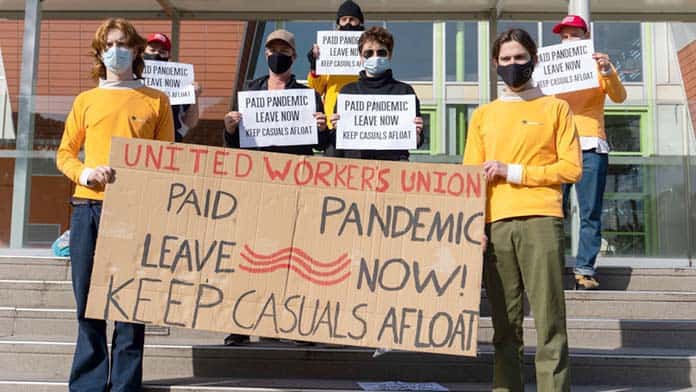As Sydney’s lockdown stretches into a third week, workers are struggling due to hopelessly inadequate government support.
Casual workers at pubs, restaurants, cafes and other businesses have been stood down as they close or reduce staff.
Gemma Stubbs is a casual worker at the Lansdowne Hotel in Ultimo where staff have been stood down. Casuals have been left without pay.
Scott Morrison is providing a maximum pandemic payment of $500 a week for those who have lost 20 hours of work or more, available from the second week of the lockdown. But this is far less than casuals might have earned normally.
“When this happened it was my uni break. I was going to be able to earn $700 or $800 a week, so I’m missing out on the money I was meant to be accumulating before I went back to uni”, Gemma said.
“My rent’s $200 a week and the payment we’re getting is $500 [for the first] fortnight so I’ve got $100 left over to pay the bills, buy food and for medical expenses.
“Before the lockdown I was on a four week unpaid placement full-time Monday to Friday, so I could only work Friday and Saturday nights. Then I’ve got a ten week placement coming up.
“So I’m missing out on the money I was meant to be saving up.”
The $500 weekly payment is far lower than the rate of JobKeeper and JobSeeker payments in place during last year’s lockdowns. Workers who’ve lost less than 20 hours a week only receive $325.
And as the United Workers Union’s Dario Mujkic told the ABC, “There’s plenty of part-time and full-time workers also struggling. Last year a lot of workers had to fund their own crisis, if they had entitlements, if they had savings, they would have used them up. Many had to go into their super and use that up as well.”
Premier Gladys Berejiklian has flagged plans for further support, but there are no details so far.
The lack of JobKeeper this time around, on top of a lack of sick leave for casuals, means that more people are forced to continue going into work, and risk catching and spreading the virus.
Many shops and retail outlets have been operating as normal. This saw one infected staff member working at Ikea in Tempe for 11 hours last Tuesday—during the lockdown—leading NSW Health to list 2000 people as close contacts required to isolate for 14 days.
NSW’s Chief Health Officer Kerry Chant has pointed to “a number of workplace clusters” as the key factor in the virus spreading into south-western Sydney. These include 27 cases from the Great Ocean Foods warehouse in Marrickville, 28 from the Lyfe Cafe in Bondi and 15 from Joh Bailey’s hairdresser in Double Bay.
Fight for pandemic pay
Workers at the Annette Kellerman pool in Enmore have also been stood down, despite council-run pools in the area continuing to pay staff.
Some have applied for the government pandemic payment, but one worker told Solidarity, “The rules block a lot of people. People that are already receiving Centrelink payments can’t get it. The maximum you can get is $500 a week if you work 20 hours. It’s less money than you’d be getting if you were working.”
Management of the pool has been contracted out to private company Belgravia, which runs 110 swimming polls, sports centres and camping grounds across Australia and New Zealand with 6000 staff.
When the lockdown began staff were contacted immediately and stood down. “I was working that day and my manager told me on the spot”, one worker told Solidarity.
Around half the staff are permanent part-time and the rest casuals. “The majority of our workforce are older and pay rent and have other commitments”, he said.
“The company boast on their website they have a $180 million turnover, $2 billion in assets and the CEO is a multi-millionaire. It’s pretty obvious that they have the capacity to pay us.
“They told us the reason they can’t is that they don’t have any revenue coming in. I find it hard to believe that this massive multi-national company doesn’t have money in the bank. The reason they don’t want to pay us is sheer greed.”
The workers and their union, the United Workers Union, have launched a campaign to pressure the company for paid pandemic leave for all staff.
“We first started with a petition, that’s sitting at 750 signatures. Then we had a small protest outside Annette Kellerman that workers showed up to holding signs.
“That was in the park so members of the public saw it and were asking questions. The photos were posted by the United Workers Union on their Facebook page. Then we had an online day of action where members of the public posted photos holding signs for pandemic pay. That’s had a pretty big response.”
“A two week lockdown has now turned into something that could be much longer so it’s definitely time for the government to step up and give workers some proper support similar to last lockdown.” he said. “And it’s also time for Belgravia to take some responsibility. They said it’s up to the government to provide support not us. What would make them support their workers if a global pandemic wouldn’t?”
With the likelihood the lockdown will be extended further to four weeks and beyond, the need for more financial support for workers is urgent.
“The longer it’s gone on and the more uncertainty there’s been, the financial stress and the mental toll’s just accumulated. The government’s not being clear about how they’ll support us through this,” Gemma said.
We need to demand that Morrison act to reinstate payments at the original level of JobKeeper—this time extended to cover casuals and migrant workers—and make sure no worker is left behind.
By James Supple






